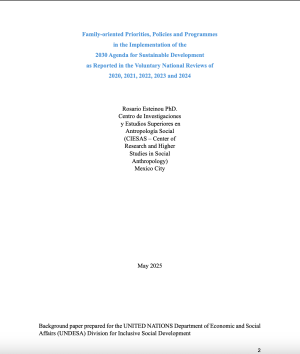The 2025 VNR Synthesis Report prepared by UN DESA’s Division for Inclusive Social Development examines how family-oriented policies have contributed to the implementation of the Sustainable Development Goals (SDGs), based on 171 Voluntary National Reviews submitted by 141 countries between 2020 and 2024. It adopts a multidimensional analytical framework that integrates socioecological models, welfare regimes, redistributive approaches, social investment, and gender responsiveness to assess family wellbeing across key SDG areas such as poverty reduction, health, education, gender equality, and urban development. The report highlights that while families remain central to development efforts, the implementation of such policies has been uneven and often weakened by the COVID-19 pandemic, conflict, and economic shocks.
The report finds that countries have made notable progress in education (SDG 4), health (SDG 3), and urban development (SDG 11), where family engagement has led to improved outcomes. However, major challenges persist in areas like gender equality (SDG 5) and child protection (SDG 16), particularly around care responsibilities and violence prevention. The report underscores that empowering families as co-implementers of social policies enhances policy reach and sustainability. It calls for a renewed global commitment to inclusive and transformative family-oriented policies to accelerate progress on the 2030 Agenda and ensure that no one is left behind.
 Welcome to the United Nations
Welcome to the United Nations
